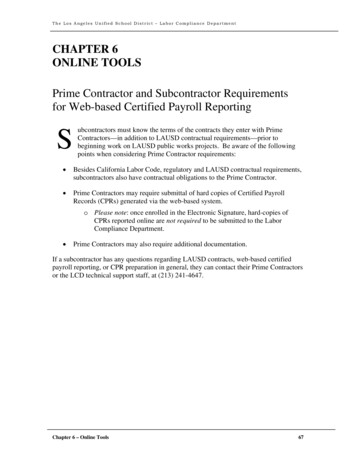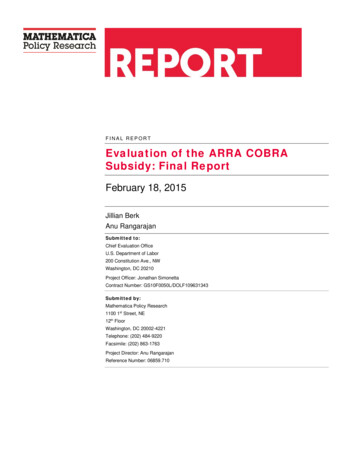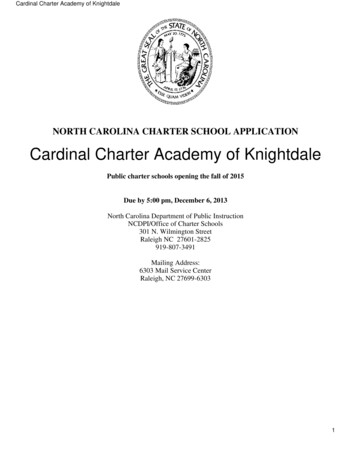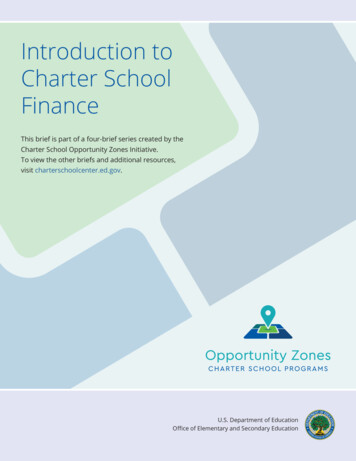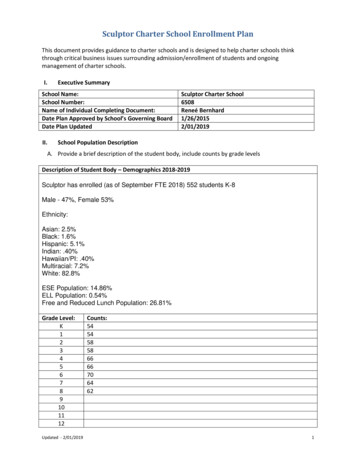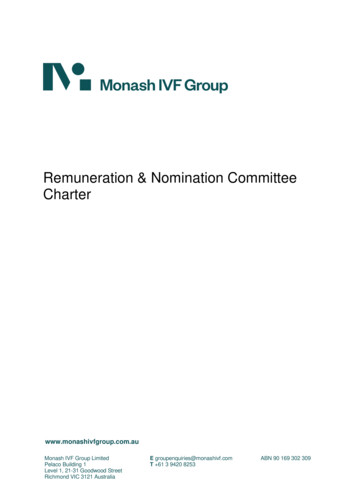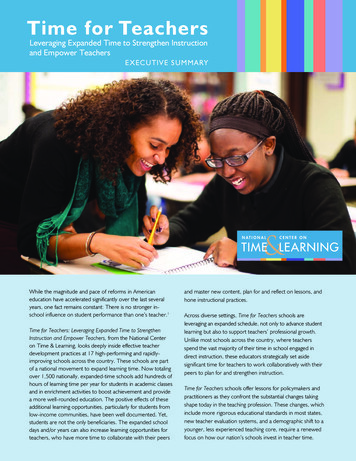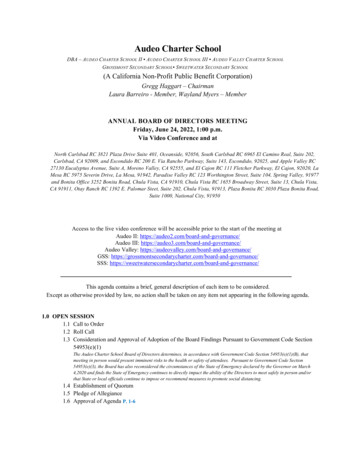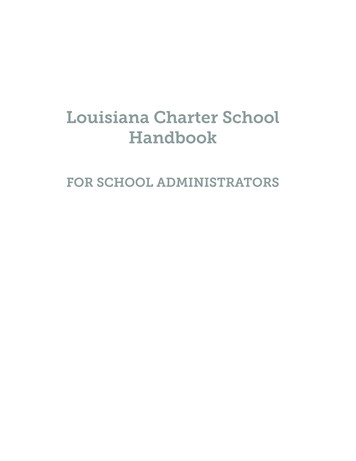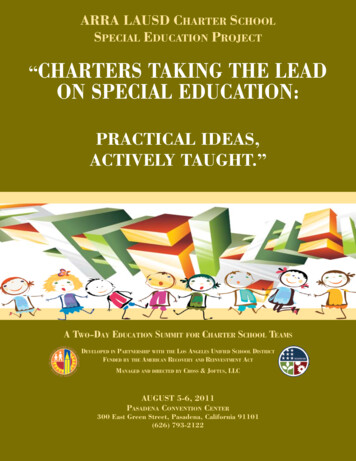
Transcription
ARRA LAUSD CHARTER SCHOOLSPECIAL EDUCATION PROJECT“CHARTERSTAKING THE LEADON SPECIAL EDUCATION:PRACTICAL IDEAS,ACTIVELY TAUGHT.”A TWO-DAY EDUCATION SUMMIT FOR CHARTER SCHOOL TEAMSDEVELOPED IN PARTNERSHIP WITH THE LOS ANGELES UNIFIED SCHOOL DISTRICTFUNDED BY THE AMERICAN RECOVERY AND REINVESTMENT ACTMANAGED AND DIRECTED BY CROSS & JOFTUS, LLCAUGUST 5-6, 2011PASADENA CONVENTION CENTER300 East Green Street, Pasadena, California 91101(626) 793-2122
CONTENTCharter School ShowcasePAGESEE SPECIAL INSERT“Charters Taking the Lead on Special Education:Practical Ideas, Actively Taught.Education Summit.”KEYNOTE SPEAKERS1August 5-6, 2011SPEAKERS BIOGRAPHIES1Keynote SpeakersInstructional StrandBehavior StrandAutism StrandLeadership StrandParent StrandTechnology StrandShowcase StrandSESSION DESCRIPTIONSKeynote General Session I & IILunch/General Sessions 1 & IILiteracyMathematicsCollaboration and gySUMMIT SCHEDULEFriday ScheduleSaturday Schedule223344455556667788101013RtI: An Every Education Revolution, Putting All the Pieces Together in aPartnershipJudy Elliott, Ph.D. is the Chief Academic Officer of the Los Angeles Unified School District. Mostrecently she was the Chief of Teaching and Learning in the Portland Oregon Public Schools, and prior tothat an Assistant Superintendent of Long Beach Unified School District in Long Beach, CA. Judy was also aSenior Researcher at the National Center on Educational Outcomes at the University of Minnesota, Collegeof Education. She started her career as a classroom teacher and then school psychologist. She received herB.S. in Education from the then State University College at Buffalo, and her Ph.D. from the State Universityof New York at Buffalo. Some of Dr. Elliott’s many interests include the problem-solving process and databased decision making to improve effective instruction, the use of formative assessments and progressmonitoring to increase instruction and behavior outcomes, and the role of leadership in systems change. Shehas trained thousands of staff, teachers, and administrators in the United States and abroad in the areasof inclusive schooling that include: the problem-solving process; Response to Instruction and Intervention;linking assessment to classroom instruction/intervention; strategies and tactics for effective instruction;and curriculum adaptation for students with disabilities. Her book writing efforts include: Strategies andTactics for Effective Instruction-II (SoprisWest, Inc.); Timesavers for Educators (SoprisWest, Inc.), Testing Students withDisabilities: Practical Strategies for Complying with State and District Requirements (2nd ed. Corwin Press), ImprovingTest Performance of Students with Disabilities on District and State Assessments (2nd ed. Corwin Press), Response toIntervention: Policy Considerations and Implementation (NASDSE, 2004). Most recently she was a lead author on theResponse to Intervention Blueprint: District Level Edition (NASDSE, 2008).Let’s get serious together! Using a Multi Tier System of Supports (aka RtI)to Achieve Improved Outcomes for ALL studentsStevan J. Kukic Ph.D. is a nationally recognized keynote presenter on Response to Intervention andhow this systems change effort supports the successful learning of all students. Dr. Kukic is Vice President ofStrategic Initiatives for Cambium Learning/Voyager, a company specializing in reaching the tough to teachwith proven and practical products, programs, professional development, and consultation. He is the pastchair of the Professional Advisory Board for the National Center for Learning Disabilities and is a memberof the Board of Directors for this Center. He worked for two years as an independent consultant, primarilywith Franklin Covey Company’s Education Division, facilitating the use of principles based on 7 Habits ofHighly Effective People with individuals and organizations. Before that, he was Director for At Risk and SpecialEducation for the Utah State Office of Education for 11 years, providing leadership for state and federalprograms for children and youth in need and previously directed a statewide center for technical assistancerelated to the education of students with disabilities. Dr. Kukic is a Past President of the National Associationof State Directors of Special Education. He is the author of over 100 articles, chapters, newspaper columns,and books, and has a Ph.D. from the University of Utah in School Administration and earned his M.A. inSchool Psychology and B.A. in Psychology at UCLA.Page 1
Instructional StrandsLiteracyJoanne Allain, a national consultant with 3t Literacy Group, works with states, districts and schoolsacross the country to develop, implement and coach practical, customized RtI systems and instruction. Hercareer experience at both the classroom and district level provides the unique perspective of a practitioner inreal schools with real students. Through the planning process, Joanne guides educators to build manageableand effective plans that apply research to a school or district’s unique needs. She also works on-site withRtI teams, teachers and administrators at primary, intermediate, middle, high school and district levelsto guide, refine, and sustain tiered instruction and planning. Joanne is the author of Logistics of LiteracyIntervention; A Planning Guide for Middle and High School, Logistics of Literacy Intervention: An RtI Planning Guidefor Elementary Schools and RtI: The Forgotten Tier; A Practical Planning Guide for Building a Data Driven Tier 1Instruction Process.MathematicsMichele Douglass, Ph.D. is the president of MD School Solutions, Inc., a company that contractswith school districts on content and pedagogy with teachers and leaders. Her experience ranges from mathinstructor to director of curriculum and instruction at Educational Testing Services. She has authored severalmath curricula, as well as professional development and technology programs.Autism StrandDiann Grimm, MA, CCC-SLP has more than 30 years of diverse experience as a Speech-LanguagePathologist and Educational Specialist in public and nonpublic schools. In these settings, Diann providedtherapy and educational services to children with all types of handicapping conditions. She has been a memberof numerous multidisciplinary assessment teams and was responsible for evaluating hundreds of students withspecial education needs, collaborating in making diagnoses and providing educators with recommendationsand strategies for positive interventions. In her 13 years with the California Department of Education, Dianndeveloped and presented over 400 workshops to general and special education teachers, speech-languagepathologists, school psychologists, administrators, paraeducators and parents on topics and issues relatedto special education. Diann has developed a creative, collaborative approach to help teachers and specialistsintegrate challenging students into general education classrooms. She also supervised graduate students andco-taught practicum courses in the Speech, Language and Hearing Sciences Department at the University ofArizona. Diann has a Master’s degree in Speech-Language Pathology and an Educational Specialist degree inSpecial Education.LAUSD Autism Support Staff use quality indicators to support programs for students with autismregardless of where students are educated. Students with autism may be in general education with supportsor special education programs. The Autism Support Staff work with all students, teachers and assistantsfollowing the principles of structured teaching and applied behavior analyses. This session will enable theparticipants to learn best practices in working with students with autism.Co-Teaching and CollaborationJennifer Huber, Ph.D. has been teaching for over 20 years in general education, special education,and inclusive settings. She received her Ph.D. at Clemson University in South Carolina in curriculum andinstruction with an emphasis in special education. Recently, Jennifer completed a post-doctoral fellowshipwith the Equity Alliance at Arizona State University where she promoted improved educational equity throughfacilitating teacher learning, professional transformation, and careful examination of people, policies, andpractices in school systems. Her research interests center around the topics of educational equity, inclusion,collaboration, teacher education and the identification of students with learning disabilities. In particular,Jennifer is interested in exploring teacher learning for educational settings that are inclusive of all studentsregardless of ability, race, class, and other group membership differences. As a National Board CertifiedTeacher, she mentored beginning teachers throughout the Los Angeles Unified School District and taught inhigher education at California State University, Northridge (CSUN) and Clemson University. She has workedas an Associate for the educational consulting company, 2 TEACH LLC (www.2TeachLLC.com), for 5 yearsand will be using Dr. Wendy Murawski’s research and publications on co-teaching as the foundation for theworkshops at this Summit.Jeffrey Sprague, Ph.D.Leadership StrandMary Ann Dewan, Ed.D. is the Executive Director of the Central Indiana Educational ServiceCenter. She previously served as the assistant superintendent in the Metropolitan School District of WayneTownship. In that role, she was responsible for the development of an early college high school, Ben DavisUniversity High School, and the Wayne Township Preschool which, after only 5 months of operation, wasthe largest licensed early childhood center in the state. Prior to becoming assistant superintendent, MaryAnn held the positions of Director of Special Education, principal, and assistant principal having served inboth the Indianapolis Public Schools and the MSD of Wayne Township. Dr. Dewan has also been an adjunctprofessor at Marian College and Butler University. Dr. Dewan earned her bachelor’s degree in elementaryeducation from Marian College with endorsements in special education from Marian College and ButlerUniversity. She earned a Master’s degree and educational leadership certification from Butler Universityand a Director of Special Education license from Ball State University. She went on to earn a doctoraldegree and superintendent’s license from Indiana State University. Dr. Dewan has delivered presentationsfor professional organizations in the areas of leadership, special education, and curriculum and instructionin Indiana and other states.Behavior Strandis an Associate Professor of Special Education and Co-Director of theUniversity of Oregon Institute on Violence and Destructive Behavior. In 2001, Dr. Sprague worked with theOregon legislature to establish the Oregon Center for School Safety in 2002. He was a classroom teacher forseven years and a school behavioral consultant for two years. Jeff was the Director of the Center for Schooland Community Integration at the Indiana University Institute for the Study of Developmental Disabilitiesbefore returning to Oregon to co-direct the IVDB. He has directed federal, state and local research anddemonstration projects related to whole school discipline, youth violence prevention, alternative education,juvenile delinquency prevention, school inclusion, school-to-work transition and employment, school systemschange, and self-advocacy. His research activities encompass applied behavior analysis, positive behaviorsupports, functional behavioral assessment, school safety and violence prevention, and juvenile delinquency.Jeff is a contributor to “Early Warning, Timely Response,” and the “1998, 1999, and 2000 President’s AnnualReports on School Safety.” Most recently, he has written a white paper on school safety for Oregon AttorneyGeneral Hardy Myers’ School Safety Coalition and a book on Crime Prevention Through EnvironmentalDesign for school administrators. Jeff co-authored a book on school safety with Hill Walker, and a book onSchool Wide Positive Behavior Supports with Annemieke Golly.2 PagePage 3
Todd Plate Esq. has broad experience helping organizations through the maze of employment andeducation law, including student discipline, board governance, discrimination, harassment, traditional labor matters and union organizing, and wrongful termination matters. Mr. Plate is a litigator with extensiveexperience in state and federal court and has represented clients through the arbitration and administrative hearing process. As part of his counseling practice, Mr. Plate does extensive training and has created amanagement training program that has been successfully implemented in both public sector and non-profitorganizations. Mr. Plate received his undergraduate degree from the University of California at San Diegoand his law degree from the University of California Hastings College of the Law.Special Education Summit 2011Session DescriptionsKeynote General Session ILet’s get serious together! Using a Multi Tier System of Supports (aka RtI) toAchieve Improved Outcomes for ALL studentsDr. Stevan KukicNathan Cross is a professional educator who has 26 years of experience as a superintendent, principal,and building-level administrator. He has extensive training and experience in collaborative decision-making,leadership team building, meeting management, and interest-based bargaining. Prior to moving into administration, he taught in the elementary school, middle school, and high school settings. He has worked at the district level as the Assistant Superintendent of Student Services in a California elementary school district. Crossholds an M.A. degree in Educational Administration from San Jose State University and an M.A. degree inCurriculum and Instruction from Michigan State University. He presently is the Senior Program Director ofthe New Administrator Program with the New Teacher Center’s School Leadership Division. As a director, heis responsible for the creation and delivery of professional development activities for educational leaders. Inaddition he also directs the New Administrator Coaching Program for the Santa Cruz Tri-County Area.All of us work throughout our careers to promote higher student achievement. Why is this quest so difficult? We can succeed with anadherence to data-based decisions 100% of the time. The Charter School movement has the potential to discover innovation beyondour wildest dreams. If we have the collaborative will, we can improve the achievement of ALL our students using a Multi Tier System ofSupports. Let’s get serious together!Keynote General Session IIRtI: An Every Education Revolution, Putting All the Pieces Together in a PartnershipDr. Judy Elliot, Chief Academic Officer, Los Angeles Unified School DistrictDr. Elliott, a nationally recognized expert in Response to Intervention (RtI), will present strategies and techniques on what works asschools begin the adventure of recognizing ways to serve “Every Student” in effective ways. She will share partnership strategies acrossschools and with the district. Dr. Elliott has implemented these strategies with exceptional success in Long Beach, Portland, Oregon andLAUSD. She will share the strategies that can lead to significant improvement when every educator works together with a clear purpose.Parent StrandTeam of Advocates for Special Kids (TASK) is a nonprofit charitable organization whosemission is to enable individuals with disabilities to reach their maximum potential by providing them, theirfamilies and the professionals who serve them with training, support, information, resources and referrals,as well as providing community awareness programs. Initially, the primary focus was on children three to 21years of age, but services evolved to include all ages, especially in the TASK Technology Center. TASK servesfamilies of children aged birth to 26 years of age under IDEA and other systems mandated to provide servicesto individuals with disabilities. Sessions will be in Spanish and English.Technology StrandBrokers of Expertise (BoE) is an interactive online environment (www.myboe.org) that provideseducators with the ability to easily access free, high-quality resources that are matched to California StateContent Standards. BoE combines a state-of-the art online system with a community of educators willing toshare their knowledge to improve the preparation of California’s next generation of citizens. It allows educators to create groups or communities for collaboration and participation in positive peer-cultures. Communities of Practice for Special Educators have been specifically designed for LAUSD Charter School educators.Infinitecpromotes inclusion and independence for children and adults with disabilities through assistivetechnology, information, training, equipment and access to specialists and resources. To advance these goals,Infinitec Media Services creates training videos and productions to help professionals who support peoplewith disabilities stay abreast of the latest advances. Originally developed for Illinois schools, these tools arenow available for anyone who wants to learn more about the power of technology to promote school success.Lunch/General SessionA New Deal on Charter RegulationsPanel Discussion including key leaders from the charter community. Facilitated by Todd Plate, Esq.John Fensterwald of the Educated Guess reports that “Charter schools will have to follow state public records, open meeting, and conflictof interest laws. They will also have to make higher academic gains on standardized tests and serve proportionally the same numbers ofspecial education and low-income students as in the surrounding neighborhood or school district to have their charters renewed. Theseare among requirements in a trio of bills that mark a meeting of the minds, after long negotiations, between a leading legislator and theprimary organization representing charter schools. ‘In a year in which charter advocates have been swatting back a slew of anti-charterlegislation, the compromises on the three bills – AB 360, AB 440 and SB 645 – and their likely passage are a notable accomplishment thatwill serve the long-term interests of the charter movement,’ according to Jed Wallace, CEO of the California Charter Schools Association.”Panelists will discuss the implications of these bills for the charter community and for California education.LiteracyLiteracy in an RtI Context: What does it Look Like at Our Elementary School?Joanne AllainResponse to Instruction and Intervention has the capacity to maximize the potential of all students and teachers. However, it is not a onesize fits all model. Each school is unique and must develop an RtI literacy plan that reflects the needs and individuality of the students,teachers, and community. This hands-on working session offers the opportunity to focus on instructional design and implementation of aRtI literacy plan that will be most effective for each school’s unique needs.Literacy in an RtI Context: What does it Look Like at Our Middle or High School?Joanne AllainShowcase StrandLAUSD Charters are leading the way on special education. Examples of some ground-breaking, successfulpractices will be shared by selected schools.4 PageResponse to Instruction and Intervention has the capacity to maximize the potential of all students and teachers. However, it is not a onesize fits all model. Each school is unique and must develop an RtI literacy plan that reflects the needs and individuality of the students,teachers, and community. This hands-on working session offers the opportunity for participants to focus on instructional design andimplementation of a RtI literacy plan that will be most effective for each school’s unique needs.Page 5
Special Education Summit 2011MathematicsThe Power of Multiple Strategies in Mathematics (Middle Grades)Dr. Michele DouglassBuilding mathematical understanding requires both the use of conceptual and procedural knowledge. The relationship of these types ofknowledge is built through students developing in-depth knowledge of a topic. During this training, participants work through problemsusing multiple strategies for getting to a solution to understand and discover how understanding multiple strategies develops an in-depthunderstanding of a topic. Participants will see how “shortcuts” and tricks often create more confusion and misunderstanding and howmultiple strategies assist students to correct the issues. Numerous hands-on activities will be presented, and participants will discussvarious alternative strategies that empower students to be successful in higher mathematics.Making Sense of Numbers (Elementary)Dr. Michele DouglassExactly, what is number sense? And just why is it so important? This session focuses on key foundational skills that help early learnersbuild a strong foundation of mathematical thinking, flexible problem solving, and a deeper understanding of number sense—which is thenumber one prerequisite to mathematical success. During the training, participants will build an understanding of the development ofnumber sense, how students learn to compose and decompose numbers, and how to address the learning of facts using multiple strategies.Hands-on activities will be modeled and shared.Improving Instruction to Close the Achievement Gap in Math, Grades 3 – 12Dr. Michele DouglassIn this session, participants will learn about the common characteristics of low-achieving mathematic students and what the researchshows will change the performance levels. Participants will experience many of the strategies that will assist low performers such as the useof representations, formative assessments, and the building of academic language. Highly effective instructional strategies will be modeledin the context of curricula and other research based instructional strategies. Systematic strategies will be shared so participants will leavewith a department, school and/or charter network or district plan for improving student achievement and tracking progress towards theidentified goals.Collaboration and Co-TeachingCollaborative Teaching: Making the Co-Teaching Marriage Work!Dr. Jennifer Huber for 2 TEACH LLCThis session is specifically designed for general education teachers, special education teachers and other specialists who currently coteach or who plan to co-teach as part of their school’s inclusion practice. Personalities, roles and responsibilities are critical in this“collaborative marriage.” Participants will learn techniques to utilize the strengths of both professional educators in the classroom,increasing differentiation and maximizing instruction. They will discuss the “Do’s and Don’ts of Co-teaching,” identify strategies for coplanning, co-instructing, and co-assessing. Dr. Huber will share research-based strategies and teaching techniques that can increase theeffectiveness and outcomes of an inclusive program through co-teaching. The focus of this session is on understanding the practicalitiesand strategies that can help make co-teaching work!Special Education Summit 2011Helping Students with Asperger Syndrome and High Functioning Autism Thrive in Secondary SchoolsDiann GrimmThis workshop will present interventions and strategies that promote the inclusion of students with Asperger Syndrome and HighFunctioning Autism in middle and high school classrooms. Authentic examples will demonstrate how secondary educators can buildcapability and confidence in supporting the success of fully-included students on the autism spectrum.BehaviorResponse to Intervention:Using Universal Screening and Positive Behavior Interventions and Supports In SchoolsDr. Jeffrey SpragueWith the No Child Left Behind Act increasingly focusing schools’ attention on test scores alone, programs that stress behavior, social development and commitment to school have sometimes gotten left behind. Research strongly indicates that schools adopting programs thattarget antisocial behavior also boost their students’ academic performance. This session will describe practices that successfully integrateacademic and behavioral supports to achieve maximum success. This session will illustrate how an RTI universal screening approachshould be used to identify students in need of additional supports, outline a framework for selecting and implementing evidence-basedinterventions in a PBIS model, and use progress monitoring methods to support data based decision making.LeadershipAligning Leadership Practices for Continuous ImprovementDr. Mary Ann DewanEducational leaders face numerous pressures for improved student achievement for all students. This session will explore processes andprotocols for charter and program leaders to align goals, staff evaluations, and professional development for improved student achievement. Best practices for instruction, teacher evaluation, and program evaluation will be shared. Participants will receive sample documents and tools to utilize. With easy to customize tools in hand, charter leaders will be prepared to develop an aligned plan or improve thealignment and accountability of an existing plan.Sharing Resources to Enhance Programs for Students with DisabilitiesDr. Mary Ann DewanCharter Schools and CMOs can benefit greatly in tight economic times from shared services models for implementing some special education and related services. A variety of shared service models, sample MOUs, and billing structures will be examined.Using Data to Drive InstructionNathan CrossParticipants will develop a clear understanding of the importance of using data to improve instruction and student learning. They willexplore the role of leadership in creating a data driven organization, particularly in the service of students with disabilities. They will learnabout different uses of formative and summative data and how it can be used effectively as part of an ongoing instructional planning cycle.Participants will have an opportunity to practice protocols for having a data conversation with individual teachers and teacher teams.AutismProfessional Learning Communities: What Are They and Where Do I Start?Helping Students with Asperger Syndrome and High Functioning Autism Thrive in K-6 ClassroomsDiann GrimmParticipants will understand the attributes of professional learning communities and how to make the Cycle of Continuous Improvement apart of their school’s culture. Participants will assess the culture of learning in their schools and develop actions for implementing and/orenhancing their own learning communities.This workshop will present strategies that elementary educators can easily implement to help students with Asperger Syndrome and HighFunctioning Autism function and thrive in K-6 general education classrooms. Simple and practical intervention ideas will be presentedusing real-life classroom examples. When these strategies are implemented by educators, students on the autism spectrum are likely toexperience greater social, emotional and academic success.Legal Advice for Leaders: Top Five Personnel Related IssuesTodd Plate Esq.6 PageIn this program participants will review the personnel issues that arise most frequently in the employment setting and provide clarity onhow to properly address each issue. Participants will leave with an understanding of the legal basis for dealing with each issue. Moreover,participants will be given real world guidance on how to navigate the landmines before they become a legal matter and result in potentiallycostly scenarios for charter schools.Page 7
Special Education Summit 2011Preventing Due Process ClaimsTodd Plate Esq.Due Process claims can be very costly for charter schools and without the correct understanding of what triggers a claim and how toprevent a claim, charter schools could face devastating outcomes. This session will directly answer the questions, what is a Due Processclaim, how does it affect charter schools, and how do charter schools prevent them? This session will give participants the confidence toask the right questions and to protect the charter school from potential liability.ParentsA.T. for Autism and Other DisabilitiesElizabeth Ortega and Laura Simmons-Martinez for TASKSpecial Education Summit 2011Brokers of Expertise — Where Educators Can Share Innovative Approaches, High-Quality Resources, and BestStrategies for Truly Inspired Teaching!Brian Ausland and Jon Knolle, Butte County Office of Education for Brokers of ExpertiseYou’re invited to learn more about Brokers of Expertise (BOE), a new online community where you can access free, high-quality,standards-matched classroom resources as well as share innovative approaches for improving instruction and showcasing excellence ineducation. In this session, you will learn how you can use my BOE to network with your school site, work groups, and project teams toincrease engagement and get those collaborative juices going! Participants are encouraged to bring their laptops.Charters Taking the Lead on Special Education – Showcase(See program insert for descriptions)TASK experts will introduce technology specifically related to disorders on the Autism spectrum and for those with developmental disabilities, including software with the following focus areas: Video modeling, social skills, life skills, vocabulary building, language development,communication, interpreting emotions and more. They will offer many ideas from low-tech interventions to high tech AAC (Augmentativeand Alternative Communication) devices. English and Spanish sessions offered.Basic IDEA Parental and Student RightsBrenda Smith and Yolanda McAlpine for TASKAn overview of the four basic rights and protections under IDEA, a brief overview of Section 504 of the Rehabilitation Act, and anexplanation of record keeping and the assessment process. English and Spanish sessions offered.TechnologyFinding, Manipulating and Simplif
higher education at California State University, Northridge (CSUN) and Clemson University. She has worked as an Associate for the educational consulting company, 2 TEACH LLC (www.2TeachLLC.com), for 5 years and will be using Dr. Wendy Murawski's research and publications on co-teaching as the foundation for the workshops at this Summit.
